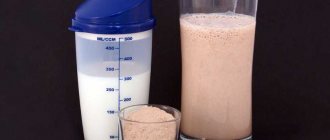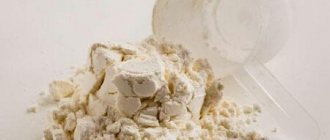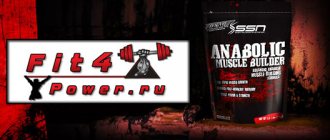Sooner or later, many people involved in strength sports think about the need to take additional food supplements. On television, in magazines, and newspapers, debates about the dangers and benefits of sports nutrition do not stop. Probably everyone already knows that anabolic steroids have a negative effect on the human body Is protein harmful or not? Is it really so necessary for athletes and will its use lead to health problems in the future? Let's try to figure it out.
What is protein
The English word protein is translated into Russian as “protein”. And protein is a necessary component of a healthy human diet, since it is involved in all life processes :
- responsible for building bone and muscle tissues of the body;
- protects against bacteria and viruses;
- is a source of energy;
- regulates metabolism in the body;
- transports oxygen in the circulatory system;
- keeps skin, nails and hair in good condition.
In sports nutrition, protein is a powder with a high protein content. It is easily absorbed by the body and contains all the essential amino acids.
Protein powder is made from natural extracts of products containing protein of animal or plant origin:
- eggs;
- soy;
- dairy products;
- meat;
- peas
The raw materials go through several stages of purification and drying, resulting in a completely natural protein concentrate , which is used in sports nutrition as an additional source of energy and material for the construction and regeneration of muscles.
How does protein affect your health?
According to doctors, consuming good quality protein powder in a reasonable dose does not have any negative effects on health. On the contrary, many scientific works have proven the beneficial effects of protein on the human body.
Protein is useful for both men who want to gain muscle mass and women who want to lose weight, get rid of skin problems and have strong, healthy hair and nails.
All parents know the important role protein plays for a child’s growing body, so the question may arise: is protein ok for children? Experts agree that protein powder in an age-appropriate dosage affects the child’s body (from 3 years old) only in a positive way. Therefore, if it is difficult for a child to feed meat or cottage cheese, but he will be happy to drink a protein shake in an age-appropriate dose, there will be no harm in it.
Lack of protein in the human body leads to:
- sleep disturbance;
- depression and irritability;
- decreased immunity;
- frequent bowel movements;
- weight gain;
- slow wound healing;
- dry skin;
- brittle hair and nails;
- development of various diseases.
Poor nutrition and diseases of the gastrointestinal tract lead to symptoms of protein deficiency in the body , and it is simply unrealistic for people with increased physical activity and athletes to achieve daily protein intake from food. This is why consuming protein powder is essential.
It is important to understand that protein is an extract from products, and any product has properties, contraindications and daily intake. In accordance with this, the benefits of protein or the harm that can be caused to the body are determined.
Advantages and disadvantages
To know for sure whether it is worth taking protein, we must know all its pros and cons. Let's look at them in more detail.
Protein benefits:
- it promotes rapid growth of muscle mass and achievement of maximum athletic results (this is extremely important for athletes);
- digests faster than regular proteins, provides the body with a full range of amino acids and nutrients;
- does not burden the gastrointestinal tract;
- contains exclusively protein without large amounts of carbohydrates and fats;
- stops negative catabolic processes;
- Athletes should drink protein to increase their endurance, strength and energy.
To be fair, we note some negative features and contraindications of protein:
- Some types of protein containing lactose can cause eating disorders. To avoid this phenomenon, you should drink supplements that do not contain this component (for example, whey protein isolate or hydrolyzate);
- Exceeding the dosage of protein more than usual loads the liver and kidneys. Therefore, if there are serious problems with these organs, it is better to limit the intake of sports nutrition;
- soy protein should not be abused by men due to the content of female hormones, which can lead to a decrease in testosterone and the appearance of excess fat;
- Unfortunately, not all supplements yet taste good.
Daily protein intake
The daily requirement for protein is individual and depends on the age, gender and physical activity of the person. In accordance with the recommendations of the World Health Organization, the norm for protein consumption is 0.8 - 1 g/kg body weight .
This is the average figure for an adult with moderate physical activity. For children under 18 years of age and pregnant women, the protein norm is 2 g/kg per day. People engaged in heavy physical labor and athletes should take 2.5 g of pure protein, for girls and women whose task is to lose weight and maintain good physical shape - 1.5 g/kg body weight.
Exceeding the daily protein intake to 3 g/kg leads to side effects: digestive disorders and kidney diseases.
If it is almost impossible to exceed the protein norm with regular food, then it is easy when consuming protein powder . This is why it is very important to follow the exact dosage when preparing a protein shake and not exceed the recommended doses indicated on the can of protein powder.
Types of Protein Powder
Before you buy protein in a sports nutrition store, it is very important to figure out which powder is right for you. To do this, you need to know the individual characteristics of the body (intolerance, allergies, chronic diseases) and take into account the purpose of use:
- gaining muscle mass;
- weight loss;
- recovery after strength training;
- maintaining general health;
- replenishment of the missing amount of protein from food (vegetarians, people with abdominal diseases).
To ensure that protein powder does not cause harm to the body, it is recommended that when choosing it, you should follow the advice of a trainer and your doctor, who will prescribe the type of protein that meets your needs in the necessary and sufficient dosage.
Animal based powders
Protein powder based on animal products is most popular among athletes:
- Egg protein is an excellent source of protein, the standard among protein powders, containing all the essential amino acids. It has the highest amino acid digestibility coefficient - 1.00 . It is egg white that is chosen by bodybuilders seeking to gain muscle mass. With its help, muscle fibers grow faster than with any other type of protein. Recent scientific studies have shown that eating egg whites strengthens the heart and blood vessels and helps increase good cholesterol levels. There is only one contraindication to taking egg whites – an allergic reaction to chicken eggs.
- Milk protein is another type of highly digestible protein powder with a full range of amino acids. Dairy proteins promote weight loss, lower blood pressure and restore muscle fibers after exhausting workouts. The main disadvantage is the lactose content, so milk protein is harmful for people who have lactose intolerance, which results in disruption of the gastrointestinal tract. Milk protein consists of two types of proteins: casein (“slow”) and whey (“fast”) proteins, which can be purchased separately.
- Casein protein is a protein found in cottage cheese. It is absorbed very slowly (up to 7 hours), thanks to which the muscles are fed with amino acids for a long time . It suppresses hunger for a long time, so casein is useful for weight loss.
- Whey protein is preferable to milk protein when building muscle mass. Absorbed by the body completely and in a short time (within 30-50 minutes).
- Beef protein is a rarity in sports nutrition stores and has a high price, so it is significantly inferior in popularity to egg and milk proteins, but its advantage is considered to be its creatine content, good tolerability (an option for athletes with allergies to lactose or chicken egg whites) and rapid digestibility .
Animal-based protein powders are completely natural, contain all essential amino acids, and are easily digestible. They are completely safe for women, men and even children. Only people with individual intolerance to animal proteins and with an increase in the recommended dose can cause harm.
Plant Based Protein Powders
Plant-based protein powders are vegetarian protein options, but are completely complete and beneficial for overall health. In addition to amino acids, they contain fiber and polyunsaturated fatty acids.
There are proteins based on hemp, flaxseed, brown rice, and peas. These types of protein powders are rarely found on sale; most often they are included in a mixture with other proteins.
The most common type of plant-based protein powder is soy protein . In terms of protein content, quality and digestibility, it is closest to animal protein powder (digestibility coefficient 0.95). It is able to quickly restore muscles after physical training and promotes their rapid growth.
But there is an opinion that soy protein is dangerous for men because it contains phytoestrogens, which are similar in action to female sex hormones. Is protein harmful to men's health? Let's look further.
What is protein needed for? Types of Protein Supplements
Proteins are present in legumes, eggs, cottage cheese, dairy and seafood. However, protein of plant origin is called “incomplete” because the amino acids here are replaceable, that is, the body itself is able to synthesize them. But the proteins contained in meat and fish have an irreplaceable composition. Therefore, they are more preferable in sports nutrition.
Bodybuilders drink protein several times daily. It is not always possible to prepare a full meal, and the missing protein is obtained with the help of special supplements. It is believed that after sleep you need to quickly take the building material to prevent catabolism. Of course, protein supplements come to the rescue.
There are different types of powder. But three of them are the most common:
- Whey has a high rate of breakdown, allowing amino acids to quickly penetrate the blood, ensuring the muscles are saturated with nutrients.
- The casein type is digested within six to eight hours, it can easily be replaced by cottage cheese, it slowly and evenly enters the bloodstream through amino acids.
- Soy, like whey, is quickly absorbed, but in popularity it is significantly inferior to the first two types and it has the advantage that it perfectly reduces cholesterol levels.
It is dissolved in ordinary water, milk or juice. It does not matter in what volume of liquid it is consumed. The main thing is that it is warm and not scalding, otherwise the powder will lose its properties. The daily dose is usually divided into two parts so that the body has time to absorb all the protein received.
For those wondering whether it is possible to take a protein supplement between breakfast and lunch, some believe that it is even necessary, since the absorption effect of food is optimal during this period. And protein amino acids will enter the blood even faster. However, if there is no training on a particular day, it is better to take the protein before your evening meal.
The number of doses per day may vary. The main condition for effectiveness is the correct daily dose. At the same time, if you drink everything at one time, some of the protein simply cannot be absorbed.
Better absorption is achieved when consumed between meals. When performing active exercises, it is recommended to drink protein immediately after training. If there are no classes on a particular day, one dose is given before dinner at night.
The optimal amount of protein intake per day is from three to five approaches.
Experienced athletes often do not limit themselves to taking one protein. They often mix the protein with creatine, another supplement that contains an important amino acid needed for active training.
For those who decide to lose a couple of extra pounds, protein can also help. In this case, protein is taken not as a food supplement, but to replace it.
Of course, this does not mean completely giving up food and switching to drinking only cocktails. This regimen can have a negative impact on your health. But it may well become a replacement for breakfast or dinner. Thus, the amount of protein in the body will increase, but calories will not increase.
With the right diet and strict adherence, girls can achieve excellent results in burning excess fat. Carbohydrates and fats in this case are reduced to a minimum amount. Evening protein intake is sometimes an excellent replacement for dinner.
The great advantage of the drug is that after taking it, you feel full and last for quite a long time. At the same time, the body continues to function normally, receiving the necessary amino acids.
Effect of soy protein on the body
Some side effects may indeed occur with long-term consumption of soy protein by men. Most often this is an allergic reaction to soy, less often – digestive disorders due to gluten intolerance .
Numerous studies have proven that phytoestrogens do not have a harmful effect on men's health and do not reduce potency if the recommended dose is not exceeded. With excessive consumption, it is possible to reduce the production of the lipase hormone responsible for the breakdown of fat, which will lead to a gain of fat mass rather than muscle mass.
For women (especially during menopause), soy protein is most preferable, since its consumption normalizes hormonal levels and prevents the development of breast cancer.
When choosing a soy protein product, you need to pay attention to the manufacturer and price, since you can purchase low-quality protein from genetically modified soybeans, which will cause more harm to health than benefit .
Negative effects of using protein powders
Protein powder has been proven to have a positive effect on the body. Protein is harmful to human health only when:
- individual protein intolerance;
- an incorrectly selected sports diet (replacing main meals with protein shakes);
- non-compliance with dosage.
The following symptoms indicate obvious protein intolerance:
- protein rash, skin itching;
- redness of the sclera of the eyes, lacrimation;
- discomfort in the gastrointestinal tract;
- intoxication of the body (nausea, vomiting, increased body temperature).
How else can protein be harmful? It is quite rare to find good quality pure protein powder in sports nutrition stores. Mostly, protein mixtures are for sale, enriched with various additives in order to increase the nutritional value and improve the taste of the protein.
Side effects from their use largely depend on the content of these additional substances. When purchasing a protein mixture, it is important to carefully study the qualitative and quantitative composition.
What ingredients in protein mixtures should you be wary of?
- Taurine is an amino acid added to all energy drinks. In small doses, it has a positive effect on health, but excess taurine makes the body work harder and increases the risk of diseases of the nervous and cardiovascular systems.
- Synthetic sweeteners (Sweeteners). They are not absorbed by the body and cause irreparable harm to health in certain diseases : renal failure (cyclamate), phenylketonuria (aspartame), heart and vascular diseases (aspartic acid). Consumption of sweeteners in large doses has an extremely negative impact on health, especially in children and adolescents.
- Thickeners (Gum Blend): xanthan gum, carrageenan. They provide optimal consistency when preparing a protein shake, but regular use of these additives, according to the latest scientific data, can lead to stomach ulcers and cancer of the digestive tract.
- Synthetic sugars: dextrose and maltodextrin are important components of sports nutrition that affect the rate of recovery after physical activity, but excessive consumption of sugars increases the likelihood of developing diabetes, obesity, and heart disease. Often, high doses of dextrose cause digestive problems.
When adding various components to protein mixtures, manufacturers are not always guided only by the benefits they bring to the body and improvement of taste. More often this is done in order to reduce the cost of the product, because protein concentrate (60 - 85% protein) or hydrolyzed isolate (consists of 90% protein) will cost much more than a mixture for preparing a cocktail with nutritional supplements.
Benefits and harms
What to be afraid of?
Opponents of protein powder believe that this product is the main cause of kidney and liver failure. Also among them are individuals who compare all sports nutrition with anabolic steroids. There is no evidence to suggest that protein supplements are harmful. There can only be individual intolerance or deviations in the functioning of internal organs, in which the intake of any unnatural substances can negatively affect health.
There have been cases when large doses of protein consumption were accompanied by a malfunction of the kidneys and liver. In most situations, the cause is not the use of sports cocktails, but weakened kidneys, addiction to alcohol, and consumption of fatty foods.
Another reason that causes organic problems is excessive protein consumption. When an athlete regularly, over a long period of time, consumes prohibitive doses of protein, this causes malaise in the kidneys, liver, and negatively affects the entire gastrointestinal tract. You don't need to consume more than 40 grams of protein at one time. You also don’t need to consume large amounts of protein per day.
Benefits of Protein
The following positive points can be highlighted, which are based on research:
| Losing weight and maintaining muscle mass | A study published in the journal Nutrition & Metabolism found that 158 subjects who consumed whey protein were able to burn more fat and retain muscle than people who did not consume the supplement. |
| Anti-cancer properties | The journal Anticancer Research published results that tentatively indicate beneficial effects when using protein supplements in the treatment of people with cancer. Research continues |
| Reducing cholesterol levels | The British Journal of Nutrition found that protein intake in men and women for 12 weeks significantly reduced total cholesterol levels. This result applies only to the whey group of proteins. Casein does not have this effect |
| Help with asthma | A study was conducted in which 11 asthmatic children participated. They were given 10 grams of whey protein twice a day for 1 month. The result is an improved immune response. The data was published in the International Journal of Food Science and Nutrition |
| Reducing the risk of cardiovascular disease | An article in the International Dairy Journal found that adding whey protein-fortified drinks to the diet significantly reduced blood pressure and the risk of cardiovascular disease. |
| HIV help | Clinical and Investigative Medicine has published studies that show the success of protein shakes in reducing weight loss in HIV-positive patients |
It is protein powder that will help you gain only lean muscle mass, unlike other sports supplements
Protein mixtures today are recommended not only for bodybuilders, but also for fitness enthusiasts, as well as for all athletes, regardless of what sport they engage in.
Modern methods of protein synthesis and purification make it possible to obtain a high-quality product that can promptly replenish your body’s “combat reserves” if necessary. At the same time, it will take much less time to assimilate it than, for example, after eating meat.
More than half of the entire diet of an athlete interested in growing muscle mass and increasing physical strength should consist of natural products containing sufficient amounts of proteins - meat, fish, eggs and poultry (all products containing protein).
Also, an athlete should not neglect carbohydrates and, to a much lesser extent, fats. A proper nutritional regimen consisting of meat products, protein and a small dose of fat is guaranteed to help any athlete achieve high performance.
To get the maximum benefit from a supplement, you need to remember the golden rule: “Supplements should not be taken instead of a normal meal, but in addition to a rich diet.”
Protein bars
Another source of protein, in addition to high-protein mixtures, are protein bars. Their protein content should be higher than fat and carbohydrates. Unfortunately, many manufacturers, under the guise of protein bars, produce products containing a variety of ingredients.
Therefore, if the purpose of consuming a bar is to additionally obtain a high dose of protein, then you need to read the label very carefully about the composition and calorie content of the product. A high-quality protein bar, like protein powder, will only bring benefits, while a cheap fake will be harmful to your health and cause excess weight .
Positive and negative effects of protein supplements
The answer to the question in today's article - is it worth drinking protein - cannot be complete without looking at all the pros and cons of protein supplements.
Let's start with the pros, here they are:
- The gain of quality mass is accelerated.
- They have a high absorption rate.
- Does not depress the digestive system.
- Virtually no fats and carbohydrates.
- Helps slow down catabolic processes.
At the same time, protein supplements also have several negative aspects:
- There may be problems for people with lactose intolerance when consuming certain types of proteins.
- High dosages significantly strain the kidneys and liver.
- Due to the presence of estrogens in soy protein, men should be careful with these protein compounds.
- Some additives may taste unpleasant.
In conclusion, I would like to say once again that most of the protein compounds should enter the body from food.
But to improve the effectiveness of training, it is almost impossible to do without protein mixtures. Find out more about whether you should take protein, see here:
What to pay attention to when purchasing and consuming protein
It has been proven that taking high-quality protein in the appropriate dosage does not harm human health. But it is worth paying attention to the following points:
- The consumption of high-protein foods should only be prescribed by a doctor or sports coach..
- You need to purchase protein powder or mixture only from well-known and trusted manufacturers.
- You cannot replace main meals with proteins and get some of the protein from meat and fish products, legumes and cereals, and nuts.
- With constant intake of high-protein mixtures throughout the year, an imbalance of hormones and electrolyte imbalance may occur in the body.
- With continuous consumption of protein mixtures for 5 years, irreversible degenerative processes begin in the liver tissues, and various diseases of the internal organs develop.
That is why it is necessary to take protein in courses under the strict supervision of a doctor. Uncontrolled long-term use is fraught with serious complications and health problems.
Protein is a healthy, completely natural biological food supplement, the correct use of which in sports and dietary nutrition does not harm the body, but helps to achieve your goals and improve health. Side effects occur only when consuming low-quality protein mixtures, in high doses or in case of individual intolerance .
Is protein harmful or not? To answer this question, you need to have an idea of what protein is - what the harm and benefits are for men and women, the opinion of doctors conducting research in the field of sports nutrition.
Protein is...
In pursuit of health and a beautiful body, people use a variety of methods to achieve these goals. Someone goes on a diet, another resorts to hard training, and a third combines both. In this article we will talk about proteins - essential elements of bodybuilding and whether protein is harmful to the body.
To dispel the doubts of those who look at all types of sports nutrition with caution, knowingly believing that this is nothing more than harmful chemicals, it is worth noting the natural origin of this protein food supplement. There are several main types of protein:
- Casein (calcium caseinate) is a protein that is obtained by enzymatic curdling of milk. It is least preferable when you need to gain muscle mass, but if you supplement it with whey, it may well work.
- Whey protein has the highest digestibility among all the supplements presented and is therefore recommended for use not only by those who are actively involved in sports, but also by those people who simply monitor their health.
- It would also not be amiss to mention egg white. A chicken egg itself is a storehouse of nutrients; the yolk alone contains 7 proteins.
- Milk protein is famous for its relative cheapness, but this in no way detracts from its usefulness, because this type of protein has a good amino acid composition in its arsenal.
- And finally, soy is by far the worst of the above proteins. In addition to the fact that it has the lowest biological value, soy protein also cannot boast of the speed of absorption.
Among the positive qualities of consuming protein, the following are worth highlighting:
- promoting muscle growth;
- achieving significant results in sports;
- normalization of insulin levels;
- ease of use.
In addition, protein, as a product that mainly contains only protein, will be an excellent solution for those people who follow a vegetarian lifestyle. It happens that you want to snack, but you only have protein on hand. Without a doubt, a protein supplement is great for a little boost.
And yet, it is recommended to combine its use with at least minor physical activity.
It has been proven that if the protein entering the body, which is then oxidized and converted into energy, is not wasted in any way, this is fraught with the formation of excess fat, which sooner or later has a disastrous effect on the human cardiovascular system, being an unpleasant consequence for both women and and for men.
The harm of protein shakes
Currently, so-called protein shakes have become popular - mixtures of proteins with mineral supplements that have high energy value. Typically, such proteins are obtained in laboratories by synthesis.
If we talk about what effect protein shakes have on the human body, here, first of all, it is worth considering for what purpose and what kind of product he uses, genetic predisposition, the presence of gastrointestinal diseases and other ailments. Take, for example, a milkshake - the fact that it contains lactate is already a good enough reason for people suffering from eating disorders to avoid drinking it.
The results of research by scientists in this area are not very encouraging. According to them, cocktails simultaneously carry harm and benefit, that is, there is talk of a “double-edged sword.”
On the other hand, if you follow the norm and before using any supplements, consult a doctor about the presence of contraindications, then the risk of getting some kind of sore along with the next portion of protein will noticeably decrease, or you may even not have to worry about side effects at all.
As for the “other side of the coin,” then everything is somewhat sad. Malignant tumors, male pattern baldness, various skin diseases, partial masculinization in girls, malfunctions of internal organs - this is not the entire list of what a person who abuses protein shakes will have to face.
There is information that people who tried to abruptly stop drinking cocktails became aggressive, noticed a tendency to violent actions, and an apathetic state. It can be suggested that protein affects some people like a narcotic substance - and, as a rule, for lack of a “dose” the body begins to rebel.
As for teenagers, it is strictly not recommended for them to take protein. Only if young people have seriously decided to engage in strength sports, the use of protein supplements is allowed under strict medical supervision.
When the conversation turns to the harmfulness of proteins, the “male problem” is always mentioned, namely erectile dysfunction. And what is most characteristic is that the fact of consuming soy proteins is almost always used as an explanation for the cause of sexual impotence, but the presence of a harmful effect of whey protein on the body as a whole and on the male reproductive system in particular has not been established.
Casein protein is quite popular - its benefits and harms have also been determined through scientific research. Casein is a slow-digesting protein, so it would be advisable to consume it before bed.
Among other things, it is an excellent help for allergy sufferers whose bodies cannot accept either egg or whey protein. There are no side effects as such, but at the same time, the casein cocktail does not provide a significant increase in strength and does not in any way affect muscle growth.
It is important to know that protein shakes from well-known companies contain the least harmful substances, while products from nameless manufacturers may contain an analogue of female hormones - phytoestrogens. Excessive consumption of protein with such “impurities” can really be dangerous for a man’s health!
Video: are proteins harmful or not?
Doctors' advice
As mentioned earlier, in order for protein consumption not to have side effects, it is necessary to create a regime for taking protein drinks, follow the dosage and, most importantly, a mandatory consultation with a doctor and personal trainer, if you have one. Protein is beneficial for health only as an additive to a balanced diet; under no circumstances should it replace the main diet.
The answer to the question of whether there is harm from protein lies in the body itself. A healthy person who does not have serious illnesses can easily consume protein shakes, using the resulting energy in intense training.
If an athlete has an allergy to one or another type of protein, individual intolerance to the components included in cocktails and other equally serious problems, an alternative should be selected, of which there are a huge number at the moment.
Proteins are a supplement that is synthesized from milk protein and used in sports nutrition; it is quickly absorbed and helps to gain muscle mass. But proteins for women are not always intended to increase muscle volume, as they are also used for weight loss. Are there any pitfalls of such nutrition and how should the fairer sex consume proteins correctly?
Proteins for women help you lose weight and get a beautiful figure.
Photo: Getty
The benefits and harms of proteins for women
People who are far from sports often confuse sports nutrition with anabolic steroids, so there is an opinion that protein is harmful. But how substantiated are the accusations?
The benefits of this sports supplement are as follows:
Protein shakes speed up muscle recovery after training;
· the minimum amount of fats and carbohydrates in such a diet reduces fat mass;
· Protein in sports nutrition is absorbed 10 times faster than regular protein foods and contains the daily requirement of this substance.
Therefore, equating proteins with prohibited steroids is wrong. In order not to harm yourself, you need to calculate the dose of sports nutrition with the help of a trainer or nutritionist, depending on your body weight and health status.
Protein is a natural product that can be harmful only in two cases:
· excessive consumption;
· individual intolerance.
If you consume protein regularly and in moderation, you will not feel discomfort, and the body, with a combination of sports nutrition and exercise, will become elastic and toned.
It is a mistake to assume that only a sports supplement can bring the body into the desired shape. Protein fuels muscles during regular training. Reviews from women who use protein for weight loss say that the effect of this method of losing weight, with the right approach, will be noticeable in a month.
Scheme for taking the supplement:
· first portion – in the morning;
· second dose – 2 hours before physical activity;
· last protein intake – 2 hours after training.
This mode is not the easiest to implement. After all, a portion of sports nutrition is a complete meal, in which no other food is allowed at the same time as taking protein. In between taking supplements, it is recommended to give preference to the following products:
· porridge;
· legumes;
· fish;
· steamed poultry;
· green vegetables;
· fruits.
A personal trainer will help you choose from a variety of protein brands that are suitable for price and quality.
Often, when doing strength training, there may be a need or desire to take additional supplements related to sports nutrition. There are still debates about the dangers and benefits of sports nutrition on the website, in newspapers, magazines or television.
It has been proven that anabolic steroids have a negative impact on human health, reflected in side effects, which cannot be said about protein. Therefore, many people have questions about whether it is necessary when playing sports, is it safe, and does it have a negative effect on the body? All these issues will be discussed below. We want to say right away that the protein is absolutely harmless!
Benefits of Whey Protein for Women
Is a rich source of protein
Whey protein is the most effective way to add protein to your diet without adding extra calories from carbohydrates or fat. It typically contains 80 to 90% protein, which provides the body with what it needs to perform its functions. Protein is especially effective for those women who regularly exercise and lead an active lifestyle. It is extremely important to support the health of the female body with high-quality protein during physical activity.
According to research published in the journal Food Science, whey protein stimulates muscle synthesis to a greater extent than casein and soy protein products. The researchers noted that taking whey protein may help increase muscle mass—especially when combined with resistance or explosive training. And also maintain muscle mass during the strict restrictive diets that women love so much, and slow down the natural muscle loss that occurs with age.
A 2007 study from Baylor University analyzed the use of supplemental protein and amino acids in 19 subjects who exercised four times a week. The researchers found that supplementing with 20 grams of protein, consisting of 14 grams of whey and casein protein, and six grams of free amino acids, resulted in greater increases in total body weight, fat-free mass, thigh mass, and muscle strength compared to those who took carbohydrates and placebo().
Helps you lose weight and burn fat
A 2014 analysis examined the effects of whey protein on weight and body composition. Researchers found that adults who consumed whey experienced significant reductions in body fat and weight. The results were even more significant among adults who combined whey protein supplementation with resistance exercise ().
Related articles:
- BCAA - application in sports and in life
- Anti-aging dietary supplements: those that really...
The study, published in the Journal of Nutrition and Metabolism, assessed the effect of a special whey supplement taken by participants who reduced their caloric intake by 500 calories per day. Compared to participants in the control group, who also cut their caloric intake by 500 calories, both groups lost a significant amount of weight, but the group that added whey protein lost significantly more body fat (6.1% of their fat mass) and showed greater preservation of lean muscle ().
Reduces food cravings
Whey protein for women who want to lose weight helps regulate appetite by influencing the satiety and hunger hormones leptin and ghrelin. Leptin influences energy balance by telling the body when it is full, while ghrelin regulates hunger and plays a role in initiating food intake. These hormones work together to tell your body when it needs to eat. Scientific evidence shows that in obese women, circulating leptin levels tend to increase, whereas ghrelin levels decrease. Whey protein helps balance the secretion of leptin and gherlin, thereby reducing cravings for carbohydrate foods and helping you prevent overeating.
A 2013 study published in the Mediterranean Journal of Nutrition and Metabolism found that whey protein may help reduce calorie intake through various physiological mechanisms. According to researchers, the amino acid content of whey protein is a major factor that influences satiety ().
In addition, the effect of whey on satiety and food intake is due to the release of ghrelin and other hormones that cause a feeling of fullness. These hormones are released in the gastrointestinal system after protein consumption, which may explain the suppression of food intake when consuming whey protein.
Stabilizes blood sugar levels
The problem of insulin resistance and diabetes due to a carbohydrate diet has become alarming in the last decade. These conditions are especially dangerous for women, as they undermine hormonal health, causing fertility problems. Therefore, the task of controlling blood sugar levels is one of the highest priorities.
Whey protein for women and men is able to stabilize blood sugar levels when consumed immediately before a high glycemic index meal. It stimulates insulin production and prevents sudden spikes in blood sugar levels.
According to a study published in the World Journal of Diabetes, whey protein can be used to treat diabetes symptoms. It slows stomach emptying, stimulates insulin and gut hormones such as incretin, which is released after eating, and lowers blood glucose levels. Whey protein can naturally lower blood sugar levels after meals, especially when consumed a few minutes before meals ().
Improves energy
Whey protein increases glycogen levels, which provide energy during exercise or strenuous activity. And it enhances the effect of leptin, a hormone that affects energy balance. Additionally, since whey is easily absorbed and available to the body, it is quickly converted into energy and can naturally boost energy levels.
A 2013 study published in the Journal of Sports Science and Medicine found that women who consumed whey protein after resistance training experienced an increase in performance markers (). Some of the performance measures tested in female basketball players included running agility, vertical jumping, and muscular endurance. Improved energy levels and performance are due to the amino acids that are present in whey protein. When your body doesn't have enough amino acids, you experience muscle wasting and delayed post-workout recovery.
In an experiment published in 2014 in the journal Medicine and Science in Sports and Exercise, scientists assessed the effectiveness of whey protein in 40 mice during exercise. They found that whey supplements improved exercise performance, strength, and body composition ().
Increases glutathione
An important benefit of whey protein for women is its ability to increase the production of glutathione, a master antioxidant found in every cell in your body. Research shows that whey protein is rich in cysteine, an amino acid that is essential for the synthesis of glutathione. Scientists at The Ohio State University found that supplementation with hydrolyzed whey protein isolate increased intracellular glutathione concentrations by 64% ().
Glutathione helps eliminate free radicals that cause cell damage, cancer, and aging diseases such as Parkinson's and Alzheimer's. It also helps protect your body from environmental toxins and drug resistance, and is important for a strong immune system.
Boosts immunity
Because whey protein promotes glutathione synthesis, it strengthens the immune system. Glutathione also enhances the effectiveness of other antioxidants such as vitamin C, coenzyme Q10, ALA, and vitamin E. Whey protein also contains a number of other proteins and vitamins, such as vitamin D, that have positive effects on immune function and demonstrate antimicrobial activity.
Scientific evidence suggests that whey protein helps the body recover after exercise, which is important for preventing immune compromise, oxidative stress, and excessive inflammation. Whey not only increases glutathione production, but also contains L-arginine and L-lysine, amino acids that promote immune function ().
Improves heart health
Whey protein has been shown to help lower blood pressure and arterial stiffness and improve lipid profiles. It works to reduce cardiovascular risk factors, protecting your muscles and helping you lose weight. Losing weight reduces problems associated with obesity, such as heart disease.
A 2020 study published in the Journal of the International Society of Sports Nutrition assessed blood pressure in 42 participants who consumed whey protein powder or maltodextrin for eight weeks. Those who used the serum experienced a significant reduction in blood pressure and increased circulation. Whey protein also lowers total cholesterol levels ().
Extends lifespan, being an anti-age agent
Whey protein has been found to increase longevity by reducing muscle wasting associated with aging and increasing nutrient absorption without increasing hunger. This is important because as you age, you lose bone mass, cellular function, and digestive function decline. Whey has been shown to reduce loss in all of these areas, making it an incredible superfood that slows down the aging process. Thus, whey protein for women can be called a universal anti-aging product.
A study conducted in Germany found that when older adults took whey protein, it caused positive effects on muscle protein synthesis, muscle mass, and muscle strength.
A study published in Nutrients in 2020 found that increasing protein intake among older adults improves muscle health, helps maintain energy balance and weight regulation, and supports cardiovascular function ().
What is protein and is it harmful to health?
Basic questions for novice athletes: what is protein and is it harmful ? Protein is translated from English as protein, which is the building material of all organs, and is also involved in many vital processes:
- helps keep hair, nails and skin in good condition;
- enriches the circulatory system with oxygen;
- stabilizes metabolic processes;
- is a source of energy;
- provides protection against viruses and bacteria;
- participates in the construction of muscle and bone tissue in the body.
Protein in sports nutrition is a powder with a high protein content, easily digestible by the body, and in total containing the necessary amino acids.
The composition of the protein powder contains extracts of protein products of plant and animal origin:
- peas;
- meat;
- dairy products;
- soy;
- eggs.
Pre-cleaned and dried raw materials are put on sale, which makes it possible to obtain the most natural protein product used by athletes and people involved in strength training, which helps muscles recover faster and gain additional energy.
Experts say that regular but reasonable consumption of high-quality protein does not have a negative impact on health; on the contrary, some studies indicate a positive effect of sports nutrition.
It is worth noting that protein is indicated not only for men who want to gain muscle mass, but also for girls who want to lose weight. In addition, sports nutrition improves health, improves the condition of skin, nails and hair. Insufficient protein intake in the body can lead to the development of various diseases, brittle nails and hair, dry skin, decreased immunity and sleep disturbances.
Gastrointestinal diseases and poor nutrition do not allow the body to receive sufficient amounts of protein, which is even more required during physical activity.
It is almost impossible to get enough protein from food, so using protein powder becomes necessary. But it is worth remembering that protein has a daily requirement, rules of use, properties and contraindications, failure to comply with which can cause one or another harm to the body.
Gainer and protein - which is better for gaining weight?
You should start by defining your goals: increase body weight or add pounds solely with muscles. Gainers include a significant amount of carbohydrates, while their protein content varies from 10 to 30%. These supplements are good for post-workout recovery or for moving up to the next weight class. However, if you set a goal to gain 15 kg of muscle mass, you cannot do without complex protein. A gainer can be used as an auxiliary product that will increase the calorie content of the diet, but will not add fat deposits.
What are the benefits of protein for men?
Is drinking protein healthy ? Of course, regardless of age and gender. Many people mistakenly think that sports nutrition is used only by people trying to build muscle mass. But protein is also useful for those who want to lose excess weight; it is used during aerobics, jogging or fitness. Adequate protein intake helps avoid catabolism—the burning of muscle tissue for energy. This process occurs when exercise is too intense, the body experiences stress and begins to draw energy from the muscles. Therefore, it is very important to consume protein to maintain muscle and gain energy. In addition to protein, these products contain amino acids, vitamins and minerals necessary for the functioning of the entire body, especially for those who lead an active lifestyle.
The benefit of protein for men is to obtain building material in sufficient quantities to build muscle mass; in addition, protein provides the energy necessary for high loads in the gym. The advantage of sports supplements is the ease of use of the product.
Is protein harmful to men's health ? If the daily dosage is observed, protein does not have a negative effect on the male body and does not lead, as many mistakenly believe, to impotence. Protein powders do not contain synthetic additives or dyes, which can negatively affect the functioning of internal organs.
Therefore, whether protein is useful for men depends on how correctly it will be used, as well as what quality of sports nutrition will be chosen, since many cheap analogues may contain various additives and preservatives.
The benefits of protein for weight loss: scientific facts
In order to lose weight, it is very important to limit the total caloric content of your diet during the day (to eat fewer calories than you burn), and not to juggle with magic products, fat burners, dietary supplements and all sorts of rubbish that only make your wallet lose weight.
Protein really plays a very important role for weight loss, since in a calorie-restricted diet
- helps preserve muscle mass from catabolism (destruction) in conditions of energy deficiency;
- requires more effort (energy) on the part of the body to digest.
Here are some scientific facts.
Experiment: The benefits of protein for weight loss under calorie restriction
In a demonstration experiment involving obese men and women over a 1-year period, researchers reduced their caloric intake by 500 kcal by putting one group on a high-protein diet (1.6 g protein per kg of body weight) and the other on a low-protein diet (0.8 g /kg).
Result: in both groups, both men and women, weight decreased approximately equally by 9.9-11.2%. This is roughly equivalent to 10kg of fat for a 100kg person! Not too bad.
But. Doesn't this example prove that protein has no benefits for weight loss: the result turned out to be the same for a high-protein and low-protein diet?
Body fat mass measurements showed that the high protein diet group had a greater reduction in fat mass
(~14.3%) compared to the low protein diet group (~9.3%), while the number of calories consumed was the same.
The conclusion is clear: the group on the low-protein diet lost more muscle mass during the experiment.
Losing weight by restricting calorie intake inevitably leads to muscle loss, and with reduced protein intake, muscle mass is lost even faster
, despite the fact that the number of calories remains the same 2.
A diet high in protein is especially useful for weight loss for older people (both women and men) who are actively losing muscle mass due to the aging process.
When losing weight on a calorie-restricted diet, if the diet is low in protein, more muscle mass is lost
Experiment: The benefits of sports protein for women's weight loss
This study involved older, overweight women ~65 years of age.
They were prescribed a calorie-restricted diet of 1,400 kcal (15%, 65%, 30% energy from protein, carbohydrates and fat), with some taking an additional 50 g of whey protein twice a day every day, and others group the same amount (50 g) of carbohydrates. The total caloric intake of the diet was the same in both groups.
After 6 months, women on protein lost an average of 8% weight, and the carbohydrate group lost 4%. In addition, the protein diet group showed less muscle loss 3.
Consuming sports protein when losing weight allows you to maintain muscle mass and slightly increase the degree of weight loss
Experiment: The effectiveness of different amounts of protein for weight loss
In another experiment, scientists compared the effectiveness of a diet with a protein proportion of 15% (relative to total calories) and 30% for weight loss.
Result: the total weight loss in the first group on a low protein diet averaged ~11 kg, 37% of which was muscle mass, but in the group on a high protein diet the total weight loss was slightly lower (~8 kg), but the loss of muscle mass — 2 times (!) less (~17.3%) 4.
A protein diet with a protein proportion of 30% (of total calories) allows you to maintain significantly more muscle mass compared to 15%
This and many other 5,6,7 studies clearly confirm that a high-protein diet is beneficial for weight loss for both men and women
, despite the fact that by nature it is easier for men to lose weight.
It doesn’t really matter what protein is used.
Even a small trend toward greater protein intake during weight loss is associated with more favorable changes in body composition in women and men 8.
Take a look at this interesting article about what simply eating eggs for breakfast can do to your body.
Share with us your experience of losing weight or gaining muscle mass!
Eating protein has clear benefits for weight loss for girls, men and women and helps maintain muscle mass on a low-calorie diet
Despite the fact that most scientific experiments involve women of Balzac’s age and there are practically no studies on the effectiveness of protein for weight loss in girls, you can rest assured that for this part of humanity that is most concerned about its problem areas, a protein diet also works.
The secret is in the properties of protein that distinguish it from carbohydrates and fats:
- it gives greater saturation (you want to eat less, since it takes longer to digest);
- Protein helps maintain muscle mass when you restrict calories;
- it has a thermogenic effect (significantly more calories are spent on its own digestion).
Is protein harmful to a woman's health?
Not only men consume sports nutrition during sports, but also girls, so the question may arise: is protein harmful to health ?
Male and female bodies have distinctive characteristics, but regardless of gender, during physical activity the body requires more protein consumption.
Harm from sports nutrition when used by women can occur in the following cases:
- with excessive consumption of the daily protein intake against the background of existing liver and kidney diseases;
- use of spoiled product;
- when consuming a counterfeit product purchased from an unverified manufacturer.
Is protein harmful to the body ? This question is often asked by girls who have experienced negative symptoms. Experts recommend that before you start taking protein, you should read the instructions for use and the presence of contraindications. The occurrence of negative reactions is often associated with intolerance to one or another type of protein, therefore, if you are allergic to soy, you should not choose soy protein and, on the contrary, if you are allergic to lactose, you should not choose milk protein. Therefore, you need to select the most suitable type of protein.
Also, many women noted that protein helped normalize hormonal levels, improving mood and well-being during menstruation. It is worth noting that sports nutrition only works in combination with physical activity; without it, you will not be able to get a slim and toned body.
Why are proteins dangerous?
Why protein is dangerous for men is one of the main questions for those who decide to start using sports nutrition. A high-quality product, in addition to protein, contains many nutrients that help maintain the body’s condition at the proper level. But still, why is protein dangerous ?
The danger may lie in the following:
- consuming sports nutrition for renal failure and kidney disease can aggravate the condition;
- purchasing a supplement from unknown manufacturers may affect the quality of the product; very often such products contain heavy metals that can provoke the development of intoxication in the body;
- If the permissible dosage is exceeded, unpleasant symptoms appear.
Why are proteins harmful for men ? Sports nutrition can provoke the development of an allergic reaction if the components of the mixture are intolerant, so when purchasing protein you should carefully read the composition.
How is protein harmful to a man’s body ? The consumption of a protein product must be in accordance with the norms; excess protein causes significant harm to the body, in which case constipation, bloating and pain are noted, which is caused by incomplete digestion of protein.
Is protein harmful or not, according to doctors?
Is protein harmful or not - the main questions asked to doctors. In general, experts have nothing against sports nutrition.
Protein is harmful to health only if the daily dosage is exceeded, and its use is also contraindicated. In order to get all the answers to your questions, it is advisable to consult a doctor who can warn and prevent the occurrence of negative consequences.
Also, some mistakenly believe that protein causes enormous harm to men , while confusing protein products with steroids. Protein is found in many foods consumed daily; it is a building material for muscles and bones. Eating a moderate amount of pure protein is not harmful to health, but you still shouldn’t forget about regular protein foods.
Whether protein is harmful to health , reviews from doctors will help you figure it out:
- Andrey Sergeev, nephrologist: for those who decide to work out in the gym with the goal of building muscle mass, protein is an excellent helper, as it replenishes the missing amount of protein and nutrients. In addition, I recommend using it for those who are overweight, but only in combination with physical activity. Rapid weight loss and a lack of protein lead to sagging and deterioration of the skin, but protein will not allow this to happen; on the contrary, it will help improve your appearance. But you can’t eat protein shakes alone; nutrition must be balanced and correct.
- Svetlana Makarova, sports consultant: I have seen rare cases where protein has a negative effect on kidney health if it is abused. Many people do not fully understand how protein works, mistakenly believing that frequent intake of protein shakes allows them to lose weight or build muscle mass without much effort. That’s why there can be negative reviews when an uninformed person takes a large amount of protein, but only gets poor health as a result.
- Tatyana Sergeeva, doctor: protein supplements from trusted manufacturers include protein and nutrients, which is safe for health. Protein is a dried product obtained from whey or milk, which indicates its naturalness. But in order to avoid negative consequences, it is necessary to strictly adhere to the dosage, neglect of which leads to a deterioration in well-being, as well as disruption of kidney function.
Dear visitors, if you find an error, please select a piece of text and press Ctrl+Enter. The error will be sent to us and we will fix it, thank you in advance.











